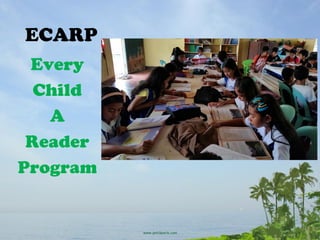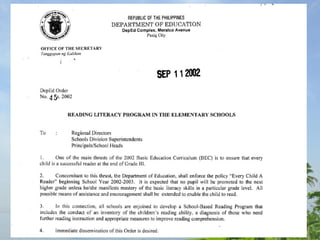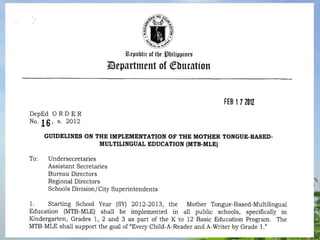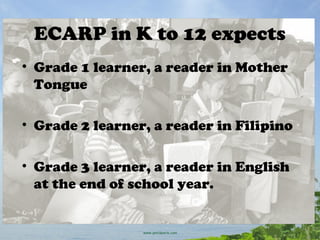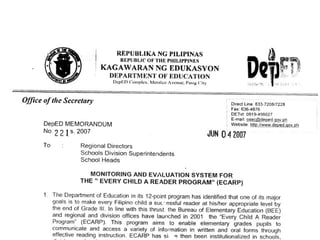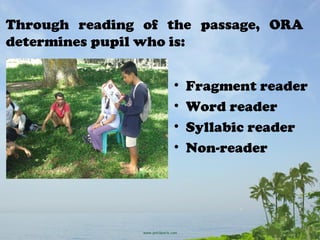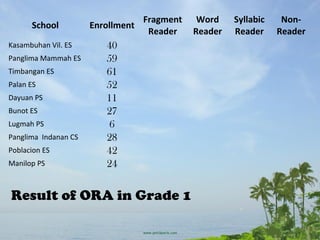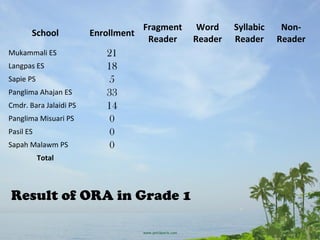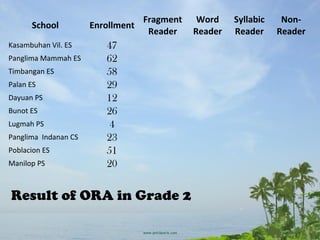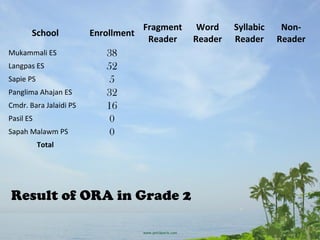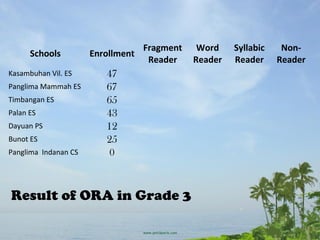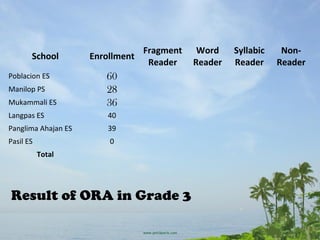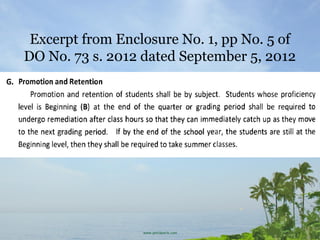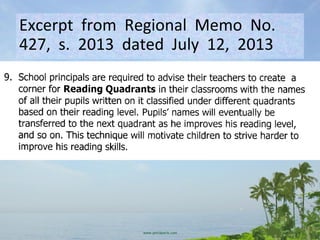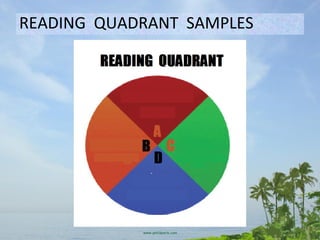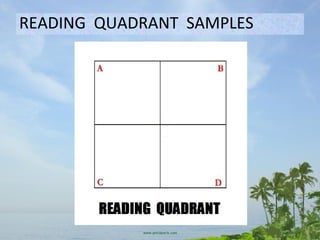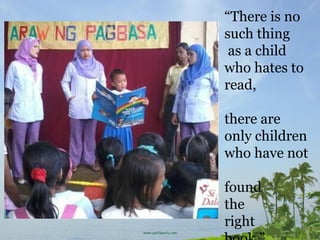ECARP for ORA
- 4. ECARP in K to 12 expects âĒ Grade 1 learner, a reader in Mother Tongue âĒ Grade 2 learner, a reader in Filipino âĒ Grade 3 learner, a reader in English at the end of school year.
- 6. ORA âĒ Oral Reading Assessment was conducted to Grades 1, Grades 2 and Grades 3 last school visit. âĒ The texts used in passage were o L1 (Mother Tongue) in Grade 1 o L2 (Filipino) in Grade 2 o L3 (English) in Grade 3
- 7. âĒ Fragment reader âĒ Word reader âĒ Syllabic reader âĒ Non-reader Through reading of the passage, ORA determines pupil who is:
- 8. School Enrollment Fragment Reader Word Reader Syllabic Reader Non- Reader Kasambuhan Vil. ES 40 Panglima Mammah ES 59 Timbangan ES 61 Palan ES 52 Dayuan PS 11 Bunot ES 27 Lugmah PS 6 Panglima Indanan CS 28 Poblacion ES 42 Manilop PS 24 Result of ORA in Grade 1
- 9. School Enrollment Fragment Reader Word Reader Syllabic Reader Non- Reader Mukammali ES 21 Langpas ES 18 Sapie PS 5 Panglima Ahajan ES 33 Cmdr. Bara Jalaidi PS 14 Panglima Misuari PS 0 Pasil ES 0 Sapah Malawm PS 0 Total Result of ORA in Grade 1
- 10. School Enrollment Fragment Reader Word Reader Syllabic Reader Non- Reader Kasambuhan Vil. ES 47 Panglima Mammah ES 62 Timbangan ES 58 Palan ES 29 Dayuan PS 12 Bunot ES 26 Lugmah PS 4 Panglima Indanan CS 23 Poblacion ES 51 Manilop PS 20 Result of ORA in Grade 2
- 11. School Enrollment Fragment Reader Word Reader Syllabic Reader Non- Reader Mukammali ES 38 Langpas ES 52 Sapie PS 5 Panglima Ahajan ES 32 Cmdr. Bara Jalaidi PS 16 Pasil ES 0 Sapah Malawm PS 0 Total Result of ORA in Grade 2
- 12. Schools Enrollment Fragment Reader Word Reader Syllabic Reader Non- Reader Kasambuhan Vil. ES 47 Panglima Mammah ES 67 Timbangan ES 65 Palan ES 43 Dayuan PS 12 Bunot ES 25 Panglima Indanan CS 0 Result of ORA in Grade 3
- 13. School Enrollment Fragment Reader Word Reader Syllabic Reader Non- Reader Poblacion ES 60 Manilop PS 28 Mukammali ES 36 Langpas ES 40 Panglima Ahajan ES 39 Pasil ES 0 Total Result of ORA in Grade 3
- 14. Excerpt from Enclosure No. 1, pp No. 5 of DO No. 73 s. 2012 dated September 5, 2012
- 15. Excerpt from Regional Memo No. 427, s. 2013 dated July 12, 2013
- 18. âThere is no such thing as a child who hates to read, there are only children who have not found the right
- 20. What specific improvement and concrete activities will you undertake? When will you start these? What will you need to do these activities? Who will be responsible/Who can support you? What will you achieve at the end of these activities? Enhanced Reading Intervention Implementation Plan Prepared by: Adviser Approved: School Head

